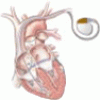More articles from Review
- Alcohol and health: A drink a day won’t keep the doctor away
Do not advise patients to start drinking alcohol for its alleged cardiovascular benefits.
- Obsessive-compulsive disorder: Unearthing a hidden problem
People with obsessive-compulsive disorder are not crazy, but they often think they are, and so they avoid seeking help.
- Pacing in heart failure: The benefit of resynchronization
Many patients with congestive heart failure might benefit from a new type of pacemaker with a lead in the left ventricle.
- Cervical spondylotic myelopathy: Make the difficult diagnosis, then refer for surgery
Prompt surgical treament is key, but the diagnosis can be difficult.
- In hyperhidrosis (excess sweating), look for a pattern and cause
Generalized sweating may be secondary to many drugs or illnesses, while localized sweating is usually primary or idiopathic.
- Interpreting pulmonary function tests: Recognize the pattern, and the diagnosis will follow
We present an overview, an algorithm, and three cases to explain how to use these tests to identify the pattern of respiratory dysfunction.
- Controlling antibiotic resistance in the ICU: Different bacteria, different strategies
To control antibiotic resistance, we need to enforce infection control more stringently and use antibiotics more wisely. But the devil is in the details.
- Demystifying FluMist, a new intranasal, live influenza vaccine
The intranasal live flu vaccine is approved, but questions remain about its exact role in clinical practice.
- Heart disease and depression: Don’t ignore the relationship
Depression seems to be a risk factor for coronary artery disease. Although we do not know if treating depression can improve coronary prognosis, it can make the patient feel better.
- Indications for neuropsychological assessment
In an age of PET scans and MRI, old-fashioned paper-and-pencil testing can still have a role.



